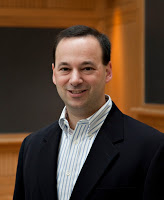- Public Policy
- Leadership
- Funding
- News & Events
- About the Center
Back to Top Nav
Back to Top Nav
Back to Top Nav
Back to Top Nav
Rockefeller Center Director Andrew Samwick provides commentary on a variety of issues in the Direct Line, which is published at the start of each term.
As we begin a new year, our nation finds itself with an odd juxtaposition of ideas. We recently the electorate to propel a relatively new face on the political scene into the White House. But in the closing two months of the campaign, it became painfully evident that financial markets and economic activity were contracting, suggesting that our expectations of what will be possible in the near future should be diminished. What is to be done about this conundrum?
One week after the election, the Rockefeller Center hosted Richard Holbrooke, former ambassador to the United Nations, as the Class of 1930 Fellow. As part of the Nelson Rockefeller Centennial Lecture Series, he spoke to an overflow crowd of students, faculty, and members of the community about the United Nations in the world today. The challenge of the United Nations, he explained, was that it was only as good as its leading member nations want it to be. Then, turning directly to the students in attendance, he said, “Barack Obama is for your generation what John F. Kennedy was for mine. He is your president. You gave him the energy to do what he did, and your generation should rally to work for the government or NGOs or any type of service.”
Ambassador Holbrooke was exactly right. We must recognize that elections are not important as the end of a process but as the beginning of a process, and for all the energy that goes into a campaign, the hardest work is yet to come. We cannot suffer election fatigue, even more so in light of the economic uncertainty that plagues us. Our government during these troubled economic times will only be as good as its most engaged citizens want it to be. And now as in the past, there is every reason for the newest generation of voters to be the most engaged citizens.
Over the last two years, during which the Center’s programs have included many activities like the presidential campaign and Nelson Rockefeller’s Centennial that aspire to reach audiences well beyond the building, I was most gratified by two things. First, we used these additional activities as educational opportunities; students were able to participate and play leadership roles in many of them. Second, even with the demands of these additional activities, the Rockefeller Center continued to expand and enhance its core curricular and cocurricular programs for students at our fastest pace ever. Despite the distress in financial markets and the slowdown in economic activity, the Rockefeller Center remains absolutely committed to providing an outstanding interdisciplinary education in public policy—in and out of the classroom, on and off campus—for each successive year of Dartmouth students. The urgency of the need to educate, train, and inspire the next generation of public policy leaders is not lost on anyone who works here, and I look forward to keeping you abreast of our continued progress in the months to come.
 Andrew A. Samwick is the Director of the Nelson A. Rockefeller Center for Public Policy and the Social Sciences, the Sandra L. and Arthur L. Irving '72a, P'10 Professor of Economics at Dartmouth College, and a research associate of the National Bureau of Economic Research. In 2003 and 2004, he served as chief economist on the staff of the President’s Council of Economic Advisers.
Andrew A. Samwick is the Director of the Nelson A. Rockefeller Center for Public Policy and the Social Sciences, the Sandra L. and Arthur L. Irving '72a, P'10 Professor of Economics at Dartmouth College, and a research associate of the National Bureau of Economic Research. In 2003 and 2004, he served as chief economist on the staff of the President’s Council of Economic Advisers.